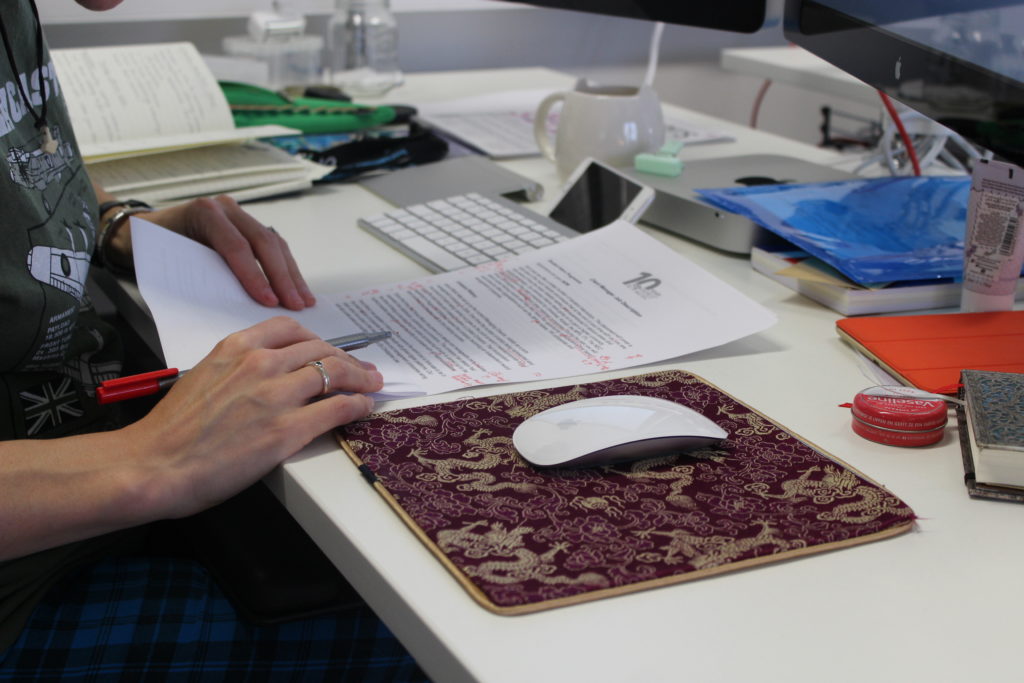 I advertise proofreading and copy-editing services and I try to be clear about exactly what you get for your money with each service. I don’t want to bore potential clients to death before they’ve got half-way down the page, though! If you’re not sure about the difference between proofreading and copy-editing and you’d like to know more, read on …
I advertise proofreading and copy-editing services and I try to be clear about exactly what you get for your money with each service. I don’t want to bore potential clients to death before they’ve got half-way down the page, though! If you’re not sure about the difference between proofreading and copy-editing and you’d like to know more, read on …
A key point is that proofreading is the final stage your manuscript will go through after typesetting and before the final print run. The purpose of proofreading is to polish and perfect a hard copy book before it goes to print. A good proofreader should try to keep changes to a minimum because it costs money for the typesetter to make amendments at this stage.
An ebook doesn’t get typeset in the same manner as a printed book. On an e-reader, the reader can choose various aspects of the text’s appearance, such as font, font size, line spacing, margins etc., so there’s no point in laying out these elements with precision. Of course, ebooks still need to be checked for errors, so even if you’re only releasing your book in digital format you might still want the services of a proofreader.
A proofreader looks at spelling, grammar, punctuation, layout and consistency. They’ll also check that your work has been typeset correctly – that page numbers and page headings are all present and correct, that illustrations and captions correspond, that styles are consistent, and that the table of contents is correct. They will check everything, including front and back matter such as the copyright page, dedication, bibliography etc. See the Society for Editors & Proofreaders website for a full explanation of what a proofreader does (and doesn’t do).
Copy-editing happens at an earlier stage, before typesetting. After copy-editing the author will probably want to make a number of changes. This may result in a few errors – usually minor – being introduced, so, no matter how good the copy-editor was, there might still be a few typos or bloopers in the finished product. That’s why it’s also a good idea to get a proofread done after typesetting, but if your budget is limited you might prefer to take a risk – particularly if your work is destined to be ‘ebook only’, without so many formatting elements to consider.
Copy-editing is concerned with getting your work ready for typesetting. A copy-editor will make sure your work is accurate and fit-for-purpose. As well as looking at spelling, punctuation and grammar, they’ll also look at style, consistency, wording, legal issues and technical design elements related to the typesetting process. If your work contains illustrations, graphs and tables these will also be covered. They should flag up doubtful facts for your attention and may query anything that looks ‘wrong’ or which is hard to understand.
A copy-editor does look at some ‘big picture’ issues such as plot holes and structure, but they won’t do the job of a developmental or structural editor. If a piece of work requires extensive rewriting, it’s too early to be using the services of a copy-editor, because much of their work will be undone during the rewriting process or they may have wasted time working on sections which are later removed. The Society for Editors and Proofreaders has an excellent and thorough explanation of copy-editing on its website.
If you would like more information or a quotation for copy-editing or proofreading, please do not hesitate to contact me.


